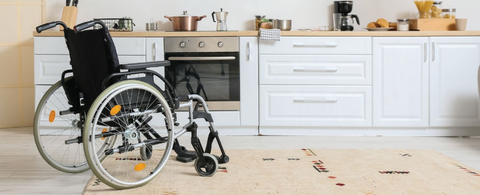Housing Adaptation Grants for People with a Disability
Assists people with a disability who have necessary adaptations, repairs or improvement works to be carried out to make their accommodation more suitable for their needs. It is suitable for those who want to adapt their home more extensively.
What does the grant cover?
You can use this grant to make your home more accessible by:
- Adding ramps or other ways to access your home
- Extending your home to create more space, for example, adding a downstairs bedroom
- Adding accessible bathroom facilities, such as an accessible shower or a ground-floor bathroom or toilet
- Installing a stair lift
- Installing grab rails
- space for wheelchair access
- an extension (typically for a bedroom or bathroom to accommodate a person with a disability)
- Installing a fixed track hoist. (This is a ceiling or wall-mounted track with a sling attached to it, which means you can be mechanically lifted and moved to different places along the track).
The grant does not cover VAT on the work. However, you can apply to Revenue for a VAT refund for any appliances that you need and the cost of installing them.
The maximum grant you can get is €30,000 or 95% of the cost of the work (whichever is less). The amount of money you get depends on your household income for the previous tax year.
If your household income is less than €30,000, you may get 95% of the cost of the works up to the maximum grant amount of €30,000.
If your house is less than 12 months old, the grant will not be more than €14,500.
As household income increases, the percentage of the costs paid by the grant gradually reduce from 95% to 30%. So, if you have a household income of between €50,001 and €60,000, you will qualify for 30% of the costs.
You may not get the maximum grant, even if you qualify for it. This is because the grant is paid by your local authority and depends on what funding they have available. They will decide whether they can pay you the full grant, or a percentage of the grant.
Your application is prioritised according to how urgent your medical needs are. There are 3 levels of priority.
Priority 1 is given to people who:
- Are terminally ill or are dependent on family or a carer
- Would be able to return home from hospital or residential care if they had the adaptations to their home
Priority 2 is given to people who:
- Are mobile but need help to access their bedroom or bathroom
- Find it harder to be independent without the adaptations
Priority 3 is given to people who are independent but need adaptations to improve their quality of life.
Does my home qualify?
Your home qualifies if it is:
- Privately owned (you or your family own it)
- Rented from a landlord and you have the landlord’s permission to make the changes. (The tenancy must also be registered with the Residential Tenancies Board).
- Provided by an approved housing body (AHB)
- A communal residence (accommodation where people live together in group homes)
How is my income assessed?
You will not get a grant if your gross annual household income is over €60,000.
Your total household income from the previous tax year is assessed to find out if you qualify and how much of a grant you will get.
Income not taken into account
The following income is not taken into account when calculating your household income:
- €5,000 for each member of the household who is under 18
- €5,000 for each member of the household who is aged between 18 and 23 and is in full-time education
- €5,000 if the person receiving the grant is being cared for by a relative on a full-time basis
- Carer's Benefit and Carer's Allowance (if the carer's payment is made for the person who needs the grant)
- Foster Care Gran
When can you start adaptations
- The grant will not be paid if you start work before you get grant approval. However, it is expected that the work will start within 6 months of your grant approval. If this does not happen, the local authority may allow a time extension. The grant is paid when the work is completed.
- The proposed works should include the installation of smoke and carbon monoxide alarms, if you don't already have them in your home.
Grant application Link :
www.gov.ie/pdf/?file=https://assets.gov.ie/119595/fb68af61-2429-414e-8f61-95ddc380f8ec.pdf#page=null
Mobility Aids Grant
This grant helps you pay for basic work to address mobility issues you are having at home. For example, if you are having difficulty getting into the bath or shower, the grant could cover the cost of installing an accessible shower.
The scheme is for older people and people with disabilities. Qualifying works include the provision of stair lifts, level access showers, access ramps, grab rails and some minor adaptation works.
The Mobility aids grant scheme provide for minor works to address mobility problems in the home. The maximum grant available is €6000 may be available to applicants with gross household incomes of up to €30,000 per annum. The form has a section that must be completed by a doctor. An Occupational Therapist report needs to be included if you are getting a stair lift with the grant.
Types of work allowable
You can use this grant to improve access in your home, like adding:
- grab rails
- a ramp
- an accessible shower
- a stair lift
How is my income assessed?
Your total household income from the previous tax year is assessed to find out if you qualify and at what level of assistance. Household income includes:
- Your annual gross income
- Your spouse or partners annual gross income
- The annual gross income of any other adults living in the household who are aged over 23 years if in full-time education, or over 18 if not in full-time education
The following income is not taken into account when calculating your household income:
- €5,000 for each member of the household who is under 18
- €5,000 for each member of the household who is aged between 18 and 23 years old and is in full-time education
- €5,000 if the person receiving the grant is being cared by a relative on a full-time basis
- Carer's Benefit and Carer's Allowance (if the carer's payment is made for the person who needs the grant)
- Foster Care Grant
How are applications prioritised?
Your application is prioritised according to how urgent your medical needs are.
The local authority prioritises people who:
- Are terminally ill or are dependent on family or a carer
- Would be able to return home from hospital or residential care if they had the adaptations to their home
Starting work to adapt my home
You should start the work within 6 months of your grant approval. If this does not happen, the local authority may allow an extension.
Grant application Link :
gov - Mobility Aids Grant (www.gov.ie)
Housing Aid Grant for Older People
Assists older people living in poor housing conditions to have necessary repairs or improvements carried out. Grant eligible works include structural repairs or improvements, re-wiring, repairs to or replacement of windows and doors, provision of water supply and sanitary facilities, and provision of heating
Assists older people living in poor housing conditions to have necessary repairs or improvements carried out.
The effective maximum grant under the scheme is €8,000, which may cover up to 95% of the approved cost of works.
This grant is for people 66 years old or more to do essential repairs, so that they can continue to live in their own home. Sometimes this grant can be paid to people under 66 years old, but only in cases of hardship.
You can use this grant to do essential repairs. This could be to:
- help repair or replace the roof
- upgrade the electrical wiring
- repair or replace doors and windows
- provide central heating (where there is no central heating or it is broken beyond economic repair)
Grant application Link :
www.gov.ie/pdf/?file=https://assets.gov.ie/119595/fb68af61-2429-414e-8f61-95ddc380f8ec.pdf#page=null




